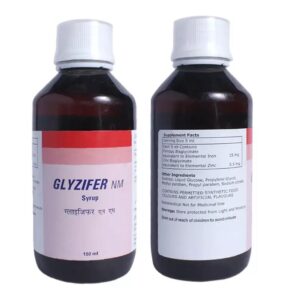ZINC + FERROUS BISGLYCINATE
Zinc: Drug: Zinc
Use: Zinc is a dietary supplement that is used to support overall health and proper functioning of the body. It is an essential mineral that plays a crucial role in numerous physiological processes.
Mechanism of Action: Zinc acts as a cofactor for more than 300 enzymes in the body, participating in various biochemical reactions. It plays a key role in cell division, DNA synthesis, immune function, wound healing, and protein synthesis. Additionally, zinc is involved in maintaining normal taste and smell senses.
Dose: The recommended daily dose of zinc varies depending on age, sex, and specific health conditions. The Recommended Dietary Allowance (RDA) for adult males is 11mg and for adult females is 8mg. However, higher doses may be needed for pregnant or lactating women, individuals with certain medical conditions, or those at risk of zinc deficiency. It is recommended to follow the instructions on the product packaging or consult with a healthcare professional for personalized dosage guidance.
Side Effects: In general, zinc is considered safe and well-tolerated when taken within the recommended dosage range. However, excessive intake of zinc can lead to adverse effects such as nausea, vomiting, stomach cramps, diarrhea, and headaches. Prolonged and high-dose zinc supplementation can interfere with copper absorption and result in copper deficiency, which may cause anemia, neurological problems, and immune dysfunction. It is important to avoid exceeding the recommended daily dose and to consult with a healthcare professional before starting zinc supplementation, especially if you have any existing medical conditions or are taking other medications.
Ferrous Bisglycinate: Ferrous Bisglycinate is a type of iron supplement. It is commonly used to treat or prevent iron deficiency anemia, which occurs when the body does not have enough iron to produce adequate amounts of red blood cells. This can lead to symptoms such as fatigue, weakness, and shortness of breath.
The mechanism of action of Ferrous Bisglycinate involves providing the body with supplemental iron. Iron is an essential mineral that plays a crucial role in the production of hemoglobin, the protein in red blood cells that carries oxygen throughout the body. When there is a lack of iron, the body cannot produce sufficient hemoglobin, resulting in anemia. Ferrous Bisglycinate is a form of iron that is easily absorbed by the body and is often preferred over other types of iron due to its lower incidence of gastrointestinal side effects.
The typical dosage of Ferrous Bisglycinate varies depending on the severity of the deficiency and the individual’s specific needs. It is usually taken orally, with or without food. The recommended dose for adults is typically 120-325 mg per day, divided into 2-3 doses. It is important to follow the instructions provided by the healthcare professional or read the label carefully to ensure the correct dosage.
Common side effects of Ferrous Bisglycinate may include nausea, constipation, diarrhea, stomach cramps, and a darkening of the stool. In some cases, it may also cause allergic reactions such as hives, difficulty breathing, or swelling of the face, lips, tongue, or throat. If any severe or persistent side effects occur, it is important to seek medical attention immediately.
It is essential to note that before starting any iron supplement, it is recommended to consult with a healthcare professional, as they can determine if Ferrous Bisglycinate is the appropriate treatment option based on an individual’s medical history, current medications, and other factors.

